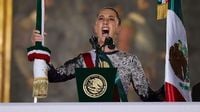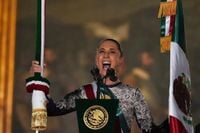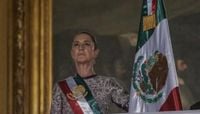On the evening of September 15, 2025, Mexico City’s Zócalo square pulsed with anticipation. Nearly 280,000 people crowded the plaza, their voices merging with the rhythms of traditional music and the scent of home-cooked pozole drifting from nearby stalls. But this year’s Independence Day celebration wasn’t just another pageant of fireworks, parades, and patriotic cheers. For the first time in over two centuries, a woman—President Claudia Sheinbaum—stood on the balcony of the National Palace, ready to lead the nation’s most powerful symbol of freedom.
As the clock ticked toward midnight, Sheinbaum stepped forward, her figure illuminated against the historic façade. She rang the palace’s bell, a ritual marking the 215th anniversary of Mexico’s independence from Spain, and delivered the iconic Grito de Dolores—the ceremonial cry of independence first proclaimed by Miguel Hidalgo in 1810. Her voice echoed across the square: “Long live the dignity of the Mexican people! Long live freedom! Long live equality! Long live democracy! Long live justice! Long live a free, independent, and sovereign Mexico!” The crowd erupted in applause, their cheers bouncing off colonial-era stones and into the night sky.
According to the Associated Press, Sheinbaum’s message was more than ceremonial. It was a declaration of a new era, both for Mexico’s traditions and its politics. The president, a scientist and former mayor who took office in October 2024, became the first woman to lead this storied celebration—a practice that, until now, had been the exclusive domain of male presidents since its formalization in 1880. Alfredo Ávila, a researcher at the National Autonomous University of Mexico, told AP, “The fact that it’s a woman who gives the cry does represent a substantial change,” noting how the event has long been “very patriarchal.”
Sheinbaum didn’t just follow tradition; she expanded it. Instead of limiting her cheers to the usual pantheon of male independence heroes, she called out the names of unsung heroines: Gertrudis Bocanegra, María Manuela Molina, and Josefa Ortiz de Domínguez, whom she named in full as Josefa Ortiz Téllez-Girón, reclaiming her identity outside the shadow of marriage. “Long live Indigenous women! Long live our migrant sisters and brothers!” Sheinbaum cried, her words electrifying the crowd and especially resonating with the women gathered below. As AP reported, this inclusive vision marked a significant shift, placing those historically left out of Mexico’s narrative at the heart of its most important celebration.
But the night was not only about history or gender. It was also a moment for political clarity. On September 16, during the traditional military parade, Sheinbaum addressed her Cabinet, thousands of soldiers, and the nation. Her message was resolute: “No foreign power makes decisions for us,” she declared. “No interference is possible in our homeland.” According to AP, while she did not name the United States directly, her remarks came at a time of heightened pressure from Washington. The U.S. government, under President Donald Trump, had pushed Mexico to intensify its crackdown on drug cartels and strengthen border security, even offering to send U.S. troops to fight cartels—some of which the U.S. had labeled as terrorist organizations. Sheinbaum has consistently rejected these proposals, emphasizing that Mexico’s actions against organized crime are motivated by national interest, not foreign pressure. “They’re carried out because they’re good for Mexico,” she insisted, as cited by AP.
Her administration’s approach has been notably more aggressive than her predecessor’s, extraditing dozens of cartel figures to U.S. authorities and pointing to reduced fentanyl seizures at the U.S. border. Yet, Sheinbaum remains firm that these steps are about sovereignty and the well-being of the Mexican people, not about appeasing foreign powers. “No foreign power makes decisions for us,” she repeated—each word a pointed rebuttal to external influence.
This year’s Independence Day was not without its shadows. In several regions, celebrations were muted or canceled entirely due to ongoing violence. Municipalities in Michoacán and Sinaloa, for instance, suspended mass festivities as cartel-related conflict continued to claim lives. Sinaloa Governor Rubén Rocha announced that only a single civic event would be held, involving all branches of government and the armed forces, due to the fierce fighting between rival factions of the Sinaloa cartel—a struggle that has left hundreds dead over the past year, according to AP.
Yet, even as violence and political tension loomed, the spirit of unity and resilience was palpable. Across Mexico, families gathered to eat traditional dishes—pozole, a hearty corn broth, and chiles en nogada, a festive dish of stuffed poblano peppers topped with creamy walnut sauce. Fireworks lit up the skies, musical performances filled the air, and the ringing of bells from the capital’s cathedral mingled with the national anthem. The celebration, as always, was both a remembrance of the past and a hopeful nod to the future.
Sheinbaum’s leadership during this milestone celebration was not lost on observers. Her inclusion of women and Indigenous voices in the Grito de Dolores, her refusal to bow to foreign intervention, and her insistence on national dignity marked a turning point. As AP and other outlets noted, the event was a blend of tradition and transformation—a reminder that independence is not just a historical event, but an ongoing pursuit. By placing herself—and, by extension, millions of Mexican women—at the heart of this defining ritual, Sheinbaum signaled that the path forward is one of inclusion, resilience, and self-determination.
In a country where the echoes of history often collide with the realities of the present, this Independence Day stood apart. The sound of a woman’s voice, ringing clear over the Zócalo, declared that Mexico’s future belongs to all who call it home. And for many, that was the most powerful cry of freedom yet.



